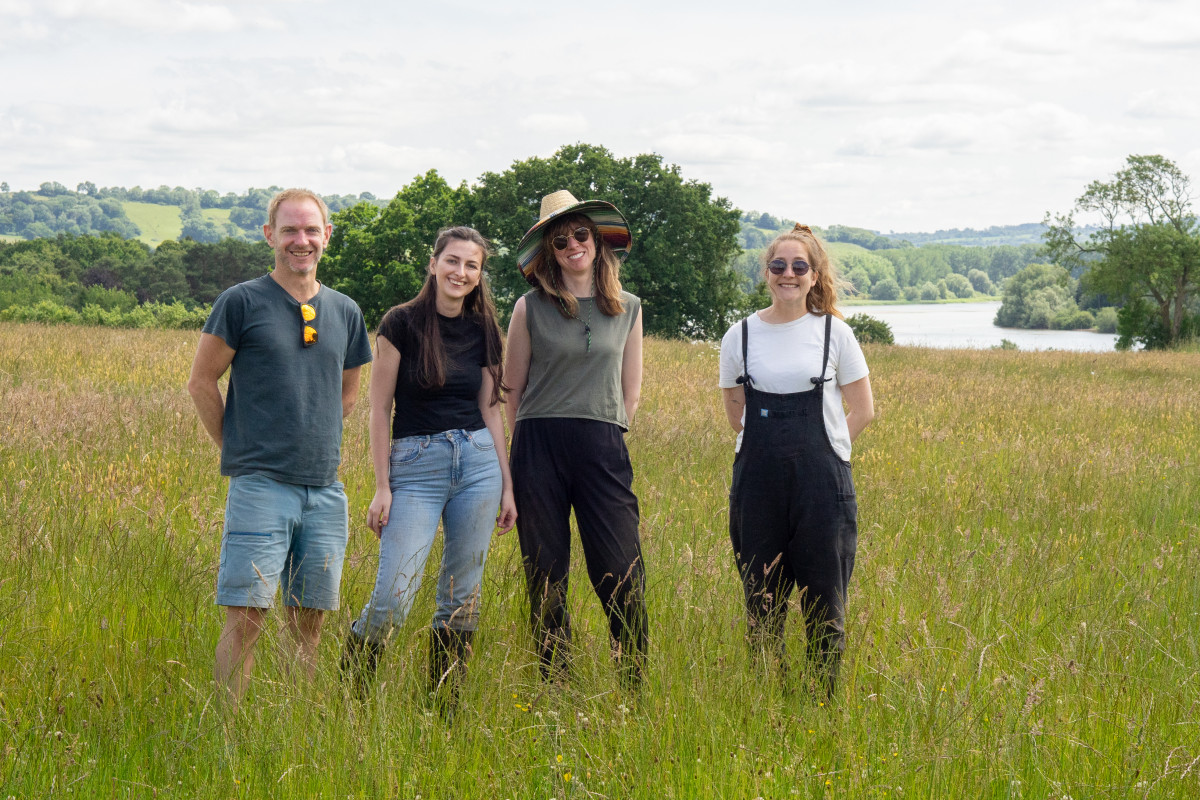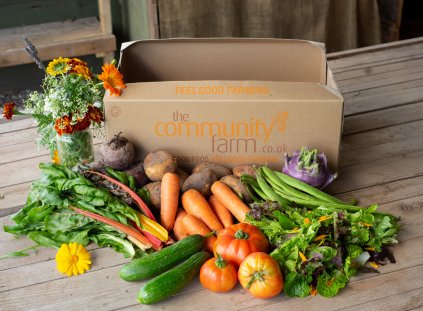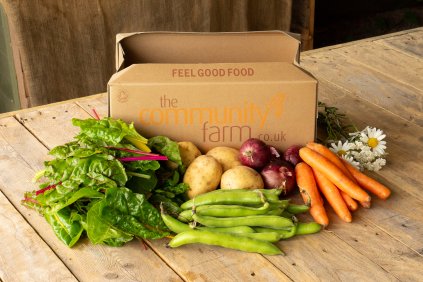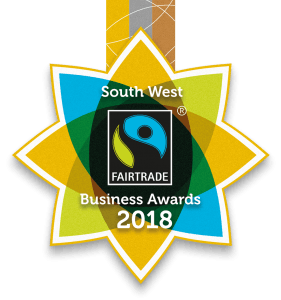A few weeks ago we popped over the hill to visit our friends and partner producers, Simon Nugent and Susanna Waters at Strode Valley Organics, who are so local to us that we can literally wave to them from our very own fields!
Simon and Susanna purchased their land back in 2012 and have, since then, transformed it from pasture and woodland into a thriving no-dig market garden and wildlife haven, as well as a home for their family. They supply produce for The Community Farm veg boxes year-round and Susanna also leads our wonderful Wassail ceremony. Here’s what they had to say about their growing operation, their aspirations and their love for The Community Farm!
What do you grow?
We grow a range of quick turn-around vegetables, including a lot of mixed-leaf salad, culinary herbs, leafy greens, roots and, occasionally, more unusual things like Agretti!
What’s the best thing about your job?
You can’t beat working out in nature in a beautiful setting, noticing as the biodiversity increases every year and knowing that we are contributing to the wider movement for agroecology and sustainable food production.
Can you tell us about your approach to growing?
We grow all our crops using a variation of Charles Dowdings' No-Dig method, which starts with layers of mulch material, such as manure and compost, and has annual top-ups of around 1inch of compost. We aim to disturb the soil as little as possible. Through the main summer season we also use well-managed strips of silage tarp in-between crops to ensure weeds are kept to a minimum, and the soil is kept moist and alive. In winter the beds are sown with a mix of cover-crops to protect the soil from the elements - we try to ensure the ground has something growing in it as much as possible, mimicking natural soil systems, to keep it alive and as ecologically balanced as possible.
Why do you grow in that way?
If you leave soil exposed, nature will very quickly try to reclaim it - (rather like a wound on our skin will heal quickly if we are healthy!). If we can work alongside this system and mimic with crops that are beneficial to either us, insects and other wildlife and the soil, we can prevent soil erosion and nutrient runoff, both which are causing huge problems in our water courses and potentially reducing future generations ability to grow food.
We are the current guardians of our bit of land, and we manage it with the philosophy of ‘leave it better than we found it”. Hopefully future generations will be grateful for the fertile, vibrant dark soil, the fruit trees, the abundant wildlife and the timber resource we’ve created here.
What’s special about your approach?
When we purchased our fields I had a bet with someone who said we wouldn’t be able to earn money with less than 50 acres. I won the bet within 3 years! We’ve managed to provide ourselves with a viable (though modest) income and employ 3 part-time seasonal workers each year, whilst helping to provide a range of shops, restaurants and box schemes with great quality, fresh food grown on less than 2 acres (which is quite a small acreage in farming terms).
We use the rest of our 9 acre farm for apple orchards, wood-chip compost production, wildflower meadows and lots of tree-planting and re-wilding areas.
What’s the best thing about your produce?
We have very high standards and deliver everything within 24 hours of harvest, so it's as fresh as possible. This was by necessity as our farm is off-grid so we don’t have mains power for a large refrigeration unit, but it’s meant we’ve kept our customers very local and has given us a reputation for great tasting, high quality veg!
Is there anything in particular that you do to encourage wildlife?
We do a lot!
We leave crops to flower where possible and sow flowering green manures on unused ground. As a result our soil is full of insect life and so many different wild birds come to forage for insects.
Our boundary hedgerows are left to ramble (they're 8 metres wide in places!) filled with blackberries, hawthorns, sloes and Oaks. All the flowering phases of these plants provide much needed food for pollinators throughout the seasons.
We’ve planted willow windbreaks which provide habitats for nesting birds.
We cut our wildflower hay pastures as late in the summer as we can, providing food and habitat for many creatures.
And it’s all making a noticeable difference. Since we started we’ve seen a huge increase in biodiversity. We now have kites, Buzzards, Barn owls, Hobbies, Kestrels, Sparrow Hawks, huge numbers of swallows and a multitude of garden birds, toads, grass-snakes, voles, otters and much more! Our fields become even more alive in May when neighbouring fields are cut for hay, meaning ours become even more alive with butterflies, crickets, wild bees and other insects seeking a safe haven. We are lucky to be next-door to another organic project who are re-wilding much of their 19acres, so between us we are feeling very proud to have created home and food for so many creatures, while also creating home and food for ourselves and our customers!
Is there anything in particular that you do to minimise your environmental impact?
Our no-dig method of farming means we keep soil disturbance to a minimum which helps store CO2 in the ground. We also aim to produce as much of our compost as possible, from our own coppice woodchip, to reduce external green waste compost and manure inputs from other farms.
We recycle and reuse as much as we can, wherever we can! Susanna has often been termed a Womble!
We re-use our 2nd hand delivery boxes multiple times and tie in deliveries with other errands to reduce vehicle miles. We only deliver within a 10-mile radius north of the farm, and a 4-mile radius to the south.
We are using compostable salad and herb bags, but the jury is out as to the embodied energy of these products versus poly-bags - it’s a very complex issue.
How do you find working with The Community Farm and what role does it play for your business?
Where do I start!! We love The Community Farm!!
We’ve worked together since we took on our land in 2012, and it’s been a hugely supportive customer ever since. In the early days Susanna worked as a warehouse packer and delivery driver and even did some of the Community Farm invoicing as a winter job! We’ve followed The Farm’s journey avidly, watching it evolve and grow, getting involved in events like the Wassail and Harvest festivals…I could go on. There’s a huge ongoing feeling of mutual support, respect and appreciation.
We’ve always felt The Farm’s keenness to source produce from as local as possible - we’re a mere 2 miles away as the crow flies (we can see The Farm’s fields from our kitchen window!), Indeed, before we started growing we always thought we’d set up a veg box scheme, but being so close-by the most logical thing has been to help supply The Farm and it’s customers with the best fresh local organic produce that we can. Long may that continue!
Viva The Community Farm!
By Simon Nugent and Susanna Waters, Strode Valley Organics














